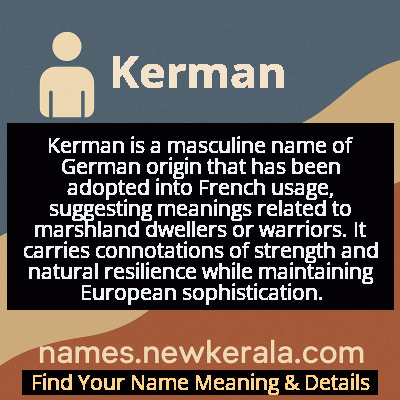Kerman Name Meaning & Details
Origin, Popularity, Numerology Analysis & Name Meaning of Kerman
Discover the origin, meaning, and cultural significance of the name KERMAN. Delve into its historical roots and explore the lasting impact it has had on communities and traditions.
Name
Kerman
Gender
Male
Origin
French
Lucky Number
8
Meaning of the Name - Kerman
Kerman is a masculine name of German origin that has been adopted into French usage, suggesting meanings related to marshland dwellers or warriors. It carries connotations of strength and natural resilience while maintaining European sophistication.
Kerman - Complete Numerology Analysis
Your Numerology Number
Based on Pythagorean Numerology System
Ruling Planet
Saturn
Positive Nature
Ambitious, efficient, realistic, and authoritative.
Negative Traits
Materialistic, stressed, confrontational, and can be overly ambitious.
Lucky Colours
Dark blue, black.
Lucky Days
Saturday.
Lucky Stones
Blue sapphire, amethyst.
Harmony Numbers
2, 4, 6.
Best Suited Professions
Business leaders, managers, financial services, law enforcement.
What People Like About You
Leadership, determination, organizational skills.
Famous People Named Kerman
Kerman Lejarraga
Professional Boxer
European Welterweight Champion
Kerman Maddox
Political Consultant
Influential political strategist and educator
Kerman Romero
Neuroscientist
Leading researcher in synaptic physiology
Name Variations & International Equivalents
Click on blue names to explore their detailed meanings. Gray names with will be available soon.
Cultural & Historical Significance
During the 19th century, Kerman gained some popularity among French families seeking names that sounded both distinctive and traditionally European, often chosen by parents wanting to honor Germanic heritage while maintaining French cultural identity. The name represents a fascinating example of how personal names can serve as markers of historical migration, cultural exchange, and regional identity. In modern times, it continues to symbolize the rich tapestry of European cultural heritage, particularly the interconnectedness of French and German linguistic traditions.
Extended Personality Analysis
Individuals named Kerman are typically perceived as possessing a unique blend of strength and sophistication. They often exhibit natural leadership qualities combined with intellectual curiosity, making them effective in both practical and analytical pursuits. The Germanic roots of the name suggest traits of resilience, determination, and practicality, while its French adoption adds layers of cultural refinement, diplomatic skill, and aesthetic appreciation.
Kermans are often described as bridge-builders—people who can navigate different social circles and cultural contexts with ease. They tend to be methodical in their approach to challenges yet creative in their problem-solving, embodying a balance between traditional values and innovative thinking. Their strong sense of personal integrity and loyalty makes them reliable friends and partners, while their natural confidence often positions them as influential figures in their professional and social circles. This combination of grounded practicality and cultural sophistication allows them to excel in fields requiring both technical expertise and interpersonal skills.
Modern Usage & Popularity
In contemporary times, Kerman remains a relatively uncommon but respected name in French-speaking regions, particularly favored by families seeking distinctive yet traditional masculine names. Its usage has seen modest growth in recent decades as parents look for names that stand out from more common choices while maintaining European roots. The name enjoys particular popularity in eastern France and among French families with Germanic heritage, where it serves as a subtle nod to cross-cultural ancestry. While not appearing in top name charts, Kerman maintains a steady presence in birth registries, often chosen by educated, cosmopolitan parents who appreciate its cross-cultural appeal and strong phonetic qualities. Its rarity adds to its appeal for those wanting a unique but not invented name for their sons, positioning it as a sophisticated alternative to more common Germanic names like Karl or Kurt.
Symbolic & Spiritual Meanings
Symbolically, Kerman represents the bridge between different cultures and traditions, embodying the synthesis of Germanic strength and French sophistication. The name carries connotations of resilience and adaptability, suggesting someone who can thrive in diverse environments and circumstances. Metaphorically, it evokes images of marshlands—places of transformation where land and water meet, symbolizing the ability to navigate between different realms or perspectives. The warrior aspect of its etymology suggests protection and courage, while the geographical element speaks to connection with nature and heritage. In a broader sense, Kerman symbolizes the modern European identity—rooted in history yet forward-looking, maintaining tradition while embracing diversity and change, making it a name that speaks to both personal strength and cultural connectivity.

